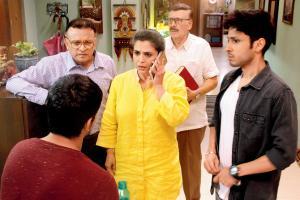One can't help but wonder if humans are naturally designed to live in urban jungles. Too late for that debate, though?

A still from the ALT Balaji web-series, Home, directed by Habib Faisal
 My most defining image of Mumbai, soon as I moved to this city, I recall rather vividly, wasn't of Marine Drive, or the Gateway of India. Those are clichés, anyway. It was of a man I noticed once, standing in utter solitude right under a relatively run-down building in Lower Parel.
My most defining image of Mumbai, soon as I moved to this city, I recall rather vividly, wasn't of Marine Drive, or the Gateway of India. Those are clichés, anyway. It was of a man I noticed once, standing in utter solitude right under a relatively run-down building in Lower Parel.
ADVERTISEMENT
Proud look on his face, hands on his hips, unaware of my prying eyes, he simply kept staring up, from low angle - quietly absorbing the dirty concrete structure before him on a quiet Sunday afternoon - almost like a king admiring the vastness of an empire he believed he held together. Like a deluded wall-lizard might assume he's actually holding the wall from falling.
He was the same pesky fellow my friend (who lived in that building), I realised, had been cursing through that afternoon while I was over. He was the Building Secretary - a powerful Mumbai designation I hadn't figured the import of until then -whose writ, along with the management committee's, singularly ran over the multiple floors of a vertical neighbourhood.
And he loved cracking the whip on my buddy (a poor tenant; right out of college). Like most others, who had to meet all kinds of odd living requirements in order to fit into the Secretary's (and the committee's) idea of acceptable, claustrophobic community living.
Which is really what many are forced into, since humans evidently prefer cluster-living over a spacious 'city beautiful', explaining the fact that while Mumbai is one of the world's most packed cities, India itself doesn't even figure in the world's top-ten, most densely populated countries. There's enough space. But nobody wants it. Ease of biz through technology, at some stage, might change that. Not yet.
Anyhow, it's obviously a pointless question whether humans are naturally designed to cohabit in urban clusters/cages, where even soothing, light music from one room, turns into nuisance for the oldie, insomniac living right behind that wall.
Does such extreme proximity also breed instant contempt? We've all heard horror stories of discrimination - based on religion, gender, profession, eating habits, even marital status - actively practised by housing societies on who they'll allow into a building. Not that the bickering among residents, regardless of their economic class, ever stops. Jolly Maker 1, India's richest housing society, just appointed an independent administrator to get rid of the fighting bigwigs in their building. Bigotry begins at home. 'Otherisation' is complete.
As is the case with Habib Faisal's web-series Home that looks at one such middle-class Mumbai family that's been banished from their building's WhatsApp group. It's a joint family - rather common among natives of Mumbai, whose children, as they grow up, have to continue sharing space with parents, grand-parents, because they can't afford an equivalent crib in a similar neighbourhood, anyway.
The patriarch of this Punjabi-Marathi household had lodged a complaint with the municipal corporation over an inflated water bill. The corporation in turn had slapped a notice on the building, questioning its legal status. Rest of the folk can't stand this self-righteous, old lawyer who went to court, raking up another case altogether.
Pariskhit Sahni - the under-used, heavily typecast son of Indian cinema's most genteel, sophisticated lead-actor Balraj Sahni - plays this family patriarch, revealing a story of blood-sucking that starts from even before you mortgage your life to buy a few square-feet of sky in Mumbai.
Home is based on the infamous Campa Cola compound case, currently being fought in court, wherein a good 25 years since people had been living in buildings in the Worli residential complex, it turns out, every floor above five was illegal, and therefore they must all vacate. I've only seen six of the 12 episodes (25 minutes each) of Home (that premieres on the Alt Balaji app over the weekend). It might be unfair to judge the entire show therefore. The final judgment on the Campa Cola case is, however, yet to come, although the Supreme Court had asked residents to vacate the building in 2014, with the municipal corporation cutting off electricity, water, and gas supplies.
Faisal, who started out as a cameraman for NDTV, covering, among other important events, the Kargil War, made his debut with the thoroughly endearing middle-class drama, Do Dooni Chaar (2010), that pretty much revived Rishi Kapoor's acting career. The film was about a family's quest for their first car.
Home, in fact, deals with far too many aspirations of a similar nature-American education, good husband, immediate healthcare; better life, basically. No, can't compare it to Do Dooni Chaar, which is a classic in its own right. But, yeah, it does make you realise, that wherever you look, the world is flat. Which isn't to say that you can't see that anyway.
Mayank Shekhar attempts to make sense of mass culture. He tweets @mayankw14 Send your feedback to mailbag@mid-day.com
Catch up on all the latest Mumbai news, crime news, current affairs, and also a complete guide on Mumbai from food to things to do and events across the city here. Also download the new mid-day Android and iOS apps to get latest updates
 Subscribe today by clicking the link and stay updated with the latest news!" Click here!
Subscribe today by clicking the link and stay updated with the latest news!" Click here!






